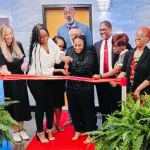City of Birmingham officials join KultureCity founders Dr. Michelle Kong, left, and Dr. Julian Maha, rear center, for the ribbon cutting for the new Tamika Hall Sensory Room at the Boutwell Auditorium. (Keisa Sharpe-Jefferson, For The Birmingham Times)
” data-medium-file=”https://www.birminghamtimes.com/wp-content/uploads/2024/04/Boutwell-1–300×191.png” data-large-file=”https://www.birminghamtimes.com/wp-content/uploads/2024/04/Boutwell-1-.png” />
By Keisa Sharpe-Jefferson | For The Birmingham Times
The City of Birmingham on Tuesday unveiled its first-ever “sensory room” at the Boutwell Auditorium in downtown for children and adults who experience sensory sensitivities – which often produce adverse reactions to loud noises or sounds, loud smells, bright lights or even large crowd gatherings.
The room was named in honor of Tamika Hall, a City of Birmingham employee who worked at the Boutwell and advocated for the room before passing away unexpectedly in late September.
The Birmingham City Council issued a proclamation on Tuesday in support of the Sensory Room.
“Anyone with a panic attack, or any other type of sensory meltdown of any sort, or just in need of a pause, is invited to utilize this space,” said Boutwell Auditorium Director Alicia Johnson Williams.
Use of the room is as simple as walking up to a guard at the Boutwell and making a request, said Williams.
” data-medium-file=”https://www.birminghamtimes.com/wp-content/uploads/2024/04/Boutwell-3-300×296.png” data-large-file=”https://www.birminghamtimes.com/wp-content/uploads/2024/04/Boutwell-3.png” class=” wp-image-119377″ src=”https://www.birminghamtimes.com/wp-content/uploads/2024/04/Boutwell-3.png” alt=”” width=”331″ height=”326″ srcset=”https://www.birminghamtimes.com/wp-content/uploads/2024/04/Boutwell-3.png 514w, https://www.birminghamtimes.com/wp-content/uploads/2024/04/Boutwell-3-300×296.png 300w, https://www.birminghamtimes.com/wp-content/uploads/2024/04/Boutwell-3-426×420.png 426w, https://www.birminghamtimes.com/wp-content/uploads/2024/04/Boutwell-3-65×65.png 65w” sizes=”(max-width: 331px) 100vw, 331px” />
Birmingham worked with KultureCity which has installed other sensory rooms throughout the area including two at the Birmingham Jefferson Convention Complex (BJCC) and one at Protective Stadium.
The nonprofit has also created sensory bags for facilities like Red Mountain Theatre, Birmingham Children’s Theatre and Sloss Furnaces which include calming devices like earphones, weighted lap pads and stress balls.
Dr. Julian Maha, an emergency room doctor with TeamHealth and his wife, Dr. Michele Kong, a pediatric intensivist founded KultureCity 10 years ago and have a 16-year-old son on the autism spectrum, which, according to Dr. Maha, “was the impetus” for starting their non-profit.
Autism is defined as a developmental brain disability that affects the social interaction and communication of those diagnosed with it, and can include sensory sensitivities.
“I think there’s been a fundamental rise in the number of people with invisible disabilities (such as autism),” said Maha. “Be it as a result of the lockdown during COVID, or just an increase in diagnosis, I think there has fundamentally been an increase in people that have a lot of difficulty wanting to go to public events or public spaces but are unable to do so because of the needs that they have from a sensory perspective. I think that’s where rooms like this come into function.”
” data-medium-file=”https://www.birminghamtimes.com/wp-content/uploads/2024/04/Boutwell-2–300×176.png” data-large-file=”https://www.birminghamtimes.com/wp-content/uploads/2024/04/Boutwell-2-.png” class=”size-full wp-image-119378″ src=”https://www.birminghamtimes.com/wp-content/uploads/2024/04/Boutwell-2-.png” alt=”” width=”990″ height=”582″ srcset=”https://www.birminghamtimes.com/wp-content/uploads/2024/04/Boutwell-2-.png 990w, https://www.birminghamtimes.com/wp-content/uploads/2024/04/Boutwell-2–300×176.png 300w, https://www.birminghamtimes.com/wp-content/uploads/2024/04/Boutwell-2–768×451.png 768w, https://www.birminghamtimes.com/wp-content/uploads/2024/04/Boutwell-2–714×420.png 714w, https://www.birminghamtimes.com/wp-content/uploads/2024/04/Boutwell-2–640×376.png 640w, https://www.birminghamtimes.com/wp-content/uploads/2024/04/Boutwell-2–681×400.png 681w” sizes=”(max-width: 990px) 100vw, 990px” />
KultureCity’s Mobile Sensory Station (M.S.S.) was parked just outside the front door of the Boutwell Auditorium. Guests were allowed to walk inside to explore the mobile sensory space.
Williams said Hall would have been proud to see the Sensory Room become a part of Boutwell Auditorium.
“She (Tamika Hall) learned about KultureCity, and she saw the work that they were doing all over the country, and she wanted to support that,” said Williams. “It was an amazing partnership (between Hall and Dr. Maha). Both are such wonderful people in their hearts and souls, and they are so committed to serving.”
Maha said, “We really love the fact that we are Birmingham-based, and the city has really embraced what we are doing. And I think we want to continue growing really, making Birmingham the first truly sensory accessible and inclusive city in the world.”











